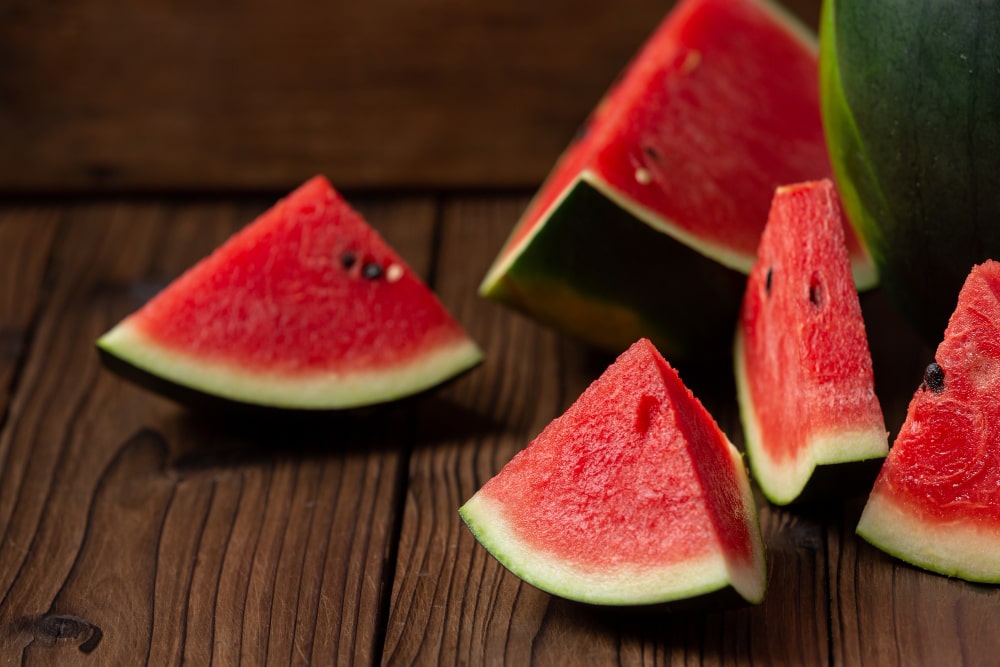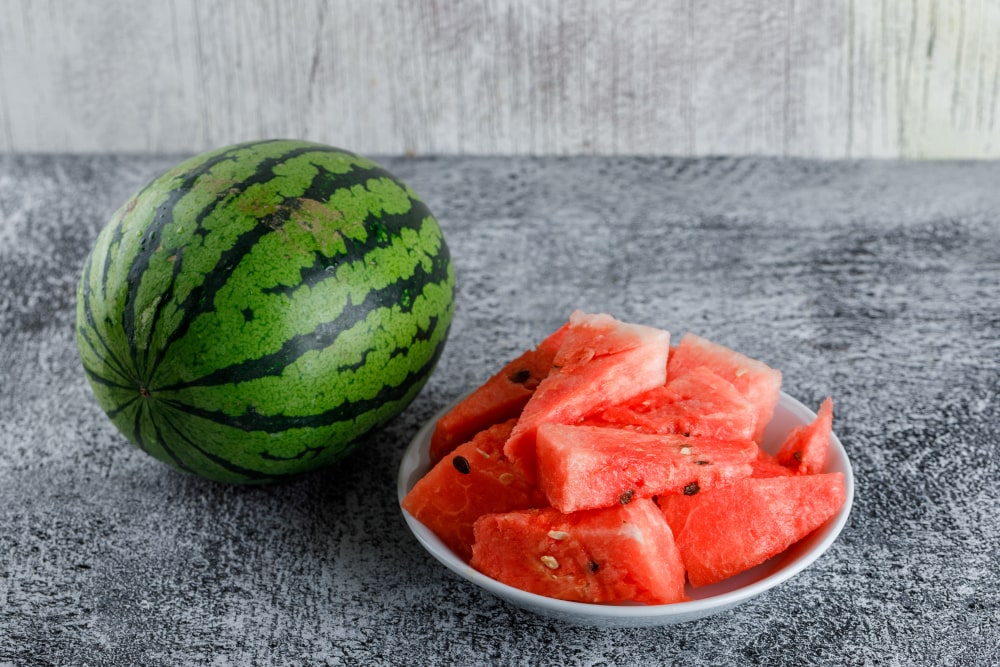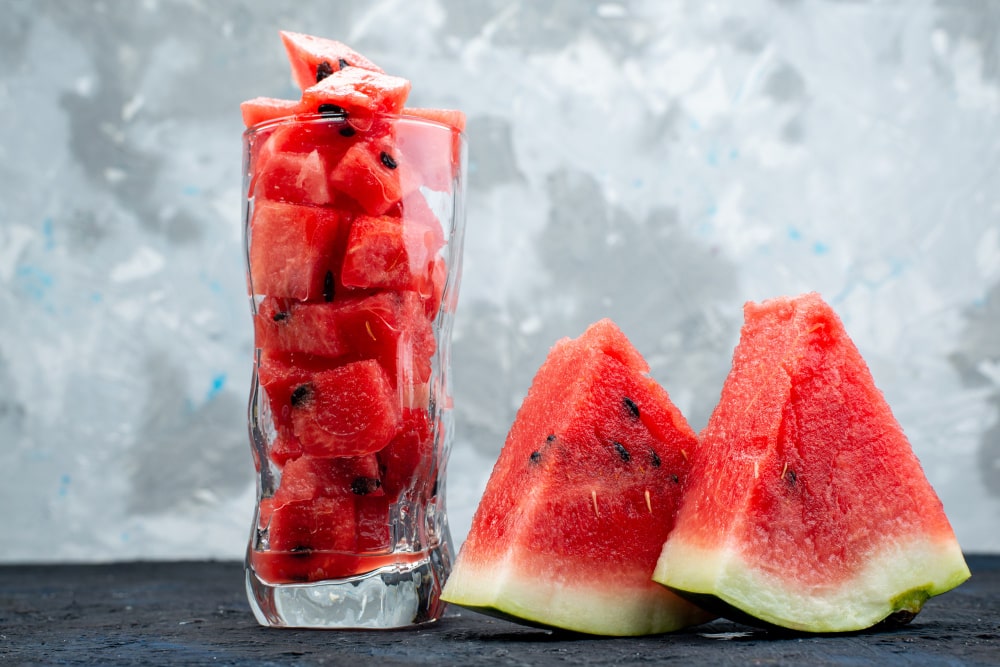Diabetes is a chronic condition affecting millions of people around the world. People with diabetes must manage their blood sugar levels to prevent serious health complications; diet plays an important role in this management. Fruits such as watermelon are often recommended for people with diabetes, but it’s important to understand how they may affect blood glucose levels. This article will discuss the benefits of eating watermelon for diabetics, how to incorporate it into a diabetes-friendly diet, and other fruits suitable for people with diabetes.
Understanding Watermelon
Watermelon is a nutritious fruit that contains various vitamins, minerals, and antioxidants. It has a low-calorie content and is made up of mostly water—about 92%! Here are some key nutritional facts about watermelon:
- Watermelon is high in vitamin C, providing up to 21% of the daily recommended value in 1 cup (154- g).
- It is a good source of vitamin A, providing 11% of the daily value in 1 cup (154 g).
- Watermelon also contains potassium, magnesium, iron, and folate.
- One cup (154 g) provides 7% of the daily recommended value for fiber.
Read More: Bone Broth Diet Plan: Benefits, Recipes and Meal Ideas
Glycemic Index and Load of Watermelon
Glycemic index (GI) and glycemic load (GL) are two terms used to describe the impact of food on blood sugar levels. Watermelon has a low GI of 72, meaning it does not cause a large spike in blood sugar levels after consumption. The GL for watermelon is 5, which is considered low.
Watermelon and Blood Sugar
The impact of watermelon on blood sugar levels is largely dependent on the individual, but some studies suggest that it can have a beneficial effect. Studies have found that eating watermelon can reduce post-meal glucose levels in people with diabetes when consumed as part of a meal. Other factors, such as the serving size, the type of carbohydrates consumed, and the individual’s blood sugar response, can all affect how watermelon impacts blood glucose levels.

Factors Affecting Blood Sugar Response
Various factors can influence how eating watermelon affects an individual’s blood sugar levels. These include:
- The serving size: Larger servings will lead to a higher rise in blood sugar levels.
- The type of carbohydrates consumed with watermelon: Consuming sugary or refined carbohydrates with watermelon can lead to a higher rise in blood glucose levels.
- How quickly the individual’s body processes the food: People who have trouble processing carbohydrates may experience a larger spike in their blood sugar after eating watermelon.
Read More: 10 best Heart Healthy Snacks: Recipes, Ideas and Tips
Recommended Serving
The American Diabetes Association recommends that people with diabetes limit their fruit intake to 2-3 servings per day. It is important to note that one serving of watermelon is considered to be ½ cup (78 g). When adding watermelon to your diet, it is important to monitor your blood sugar levels and adjust the servings accordingly.
Benefits of Watermelon for Diabetics
Watermelon is a nutritious fruit that can be incorporated into a diabetes-friendly diet. Here are some potential benefits of eating watermelon for people with diabetes:
1) Rich Source of Hydration
Watermelon is made up mostly of water, making it an excellent hydration source. This is especially important for people with diabetes because they are at higher risk of dehydration due to frequent urination.
2) Nutrient Density
Watermelon is a nutrient-dense fruit, providing a variety of vitamins, minerals, and antioxidants with each serving. This makes it an excellent choice for people with diabetes who may be more likely to develop nutrient deficiencies.
3) Potential Antioxidant Benefits
Watermelon is high in various antioxidants, such as lycopene, which can help protect against oxidative damage and inflammation. This can benefit people with diabetes at higher risk of inflammation-related conditions.

Read More: Is Corn Good for Weight Loss? Benefits, Recipes & Meal Ideas
Concerns and Considerations
While watermelon does have potential benefits for diabetics, some concerns should be taken into consideration.
Sugar Content in Watermelon
Watermelon contains natural sugar but is lower than other fruits such as banana and mango. This means that it can still be consumed by people with diabetes as long as they monitor their blood sugar levels closely and adjust their intake accordingly.
Individual Variability
Everyone’s body responds differently to different foods, and the effects of eating watermelon on blood sugar levels can vary greatly from one person to the next. It is important to monitor your blood sugar levels closely when introducing new foods into your diet to ensure that it does not cause a drastic spike or drop in your glucose levels.
Incorporating Watermelon into a Diabetic Diet
There are many ways to incorporate watermelon into a diabetes-friendly diet. Here are some ideas:
- Use watermelon in smoothies or smoothie bowls.
- Add it to salads as a refreshing addition.
- Grill slices of watermelon with other fruits and vegetables for an interesting twist on your regular grilled fare.
- Enjoy it as a snack on its own as a delicious and healthy treat.
- Try freezing cubes of watermelon for an icy snack or ingredient in cocktails.
Regardless of how you decide to enjoy it, remember that adding watermelon to your diet can benefit those with diabetes if the serving size is carefully monitored. If you are unsure how this fruit could affect your blood sugar levels, speaking with your healthcare provider or a registered dietitian is important. They can provide personalized advice on safely including watermelon into your diet.
Read More: Aloe Barbadensis Leaf Juice: Benefits, How to Make It?
Other Fruits Suitable for Diabetics
Low-Glycemic Fruits
In addition to watermelon, a variety of other low-glycemic fruits can benefit people with diabetes. These include apples, oranges, pears, strawberries, blueberries, plums and peaches. These fruits have a GI value below 55 and can be enjoyed as a balanced diet.
Benefits of Low Glycemic Fruits
Consuming low-glycemic fruits can benefit people with diabetes by helping to keep blood sugar levels in check. These fruits tend to have a lower glycemic index and contain fewer carbohydrates, which can help prevent drastic spikes in blood glucose levels. Additionally, these types of fruits are generally higher in fiber. It can help slow down the digestion of carbs and stabilize blood sugar levels.
Considerations
When incorporating low-glycemic fruits into your diet, monitoring your blood sugar levels closely and adjusting your intake accordingly is important. Additionally, these fruits may still contain natural sugars, so they should enjoy in moderation and paired with healthy proteins or fats to slow down digestion and the absorption of sugar into the bloodstream. Finally, suppose you have any questions or concerns about incorporating low-glycemic fruits into your diet. In that case, talking to your healthcare provider or a registered dietitian for personalized advice is important.
Read More: Ginger Juice Recipe: A Refreshing and Healthy Beverage
Conclusion
In conclusion, watermelon can be an excellent addition to a diabetes-friendly diet due to its nutrient density and potential antioxidant benefits. However, it is important to remember that people with diabetes should limit their fruit intake and monitor their blood sugar levels closely when introducing new foods into their diets. Additionally, other low-glycemic fruits, such as apples, oranges, pears, strawberries, and blueberries, can enjoy as part of a balanced diet. If you have questions or concerns about incorporating watermelon or other low-glycemic fruits into your diabetes-friendly diet. You should speak with a healthcare professional or registered dietitian for personalized advice.
FAQs
Yes, it is possible to consume too much watermelon for people with diabetes. Eating too much could lead to a drastic spike in blood sugar levels and can cause digestive issues such as diarrhea and cramps due to its high fiber content. It is important to monitor your intake carefully and speak with a healthcare provider or registered dietitian if you have any questions or concerns about consuming watermelon.
Yes, there are a variety of potential health benefits that can associate with consuming watermelon. This type of fruit is rich in antioxidants and vitamins like vitamins A, C, and potassium. Additionally, it contains lycopene, which could help protect against certain types of cancer and heart disease.

